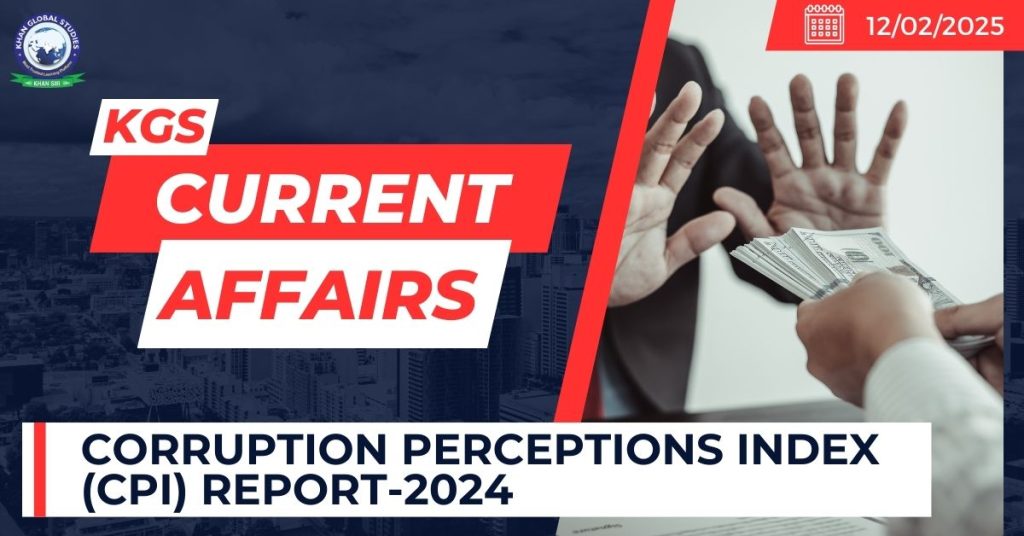Context: Transparency International released the Corruption Perceptions Index (CPI) for 2024 and India ranked 96 among 180 countries.
About CPI

- The 2024 Corruption Perceptions Index (CPI) ranks 180 countries based on perceived public sector corruption.
- It highlights corruption as a global issue, though some countries are showing improvement.
- The report also identifies corruption as a major barrier to climate action, obstructing efforts to reduce emissions and adapt to global heating effects.
Steps to calculate the CPI:
- Standardize Data Sources: Scores are standardized by subtracting the mean and dividing by the standard deviation of each source in the baseline year, ensuring comparability since 2012. The scores are then scaled to the CPI’s 0-100 range.
- Calculate the Average: A country’s CPI score is the average of at least three sources, rounded to whole numbers.
- Report Uncertainty: The CPI score includes a standard error and confidence interval to reflect variation across data sources.
Corruption Perceptions Index (CPI) 2024 report:
- India’s Ranking and Score: India ranked 96th out of 180 countries, with a score of 38 in 2024, down from 39 in 2023 and 40 in 2022.
- Neighboring Countries:
- Pakistan: Ranked 135th
- Sri Lanka: Ranked 121st
- Bangladesh: Ranked 149th
- China: Ranked 76th
- Denmark ranked as the least corrupt, followed by Finland and Singapore while South Sudan ranks last including Somalia and Venezuela ranking low in the report.
- Global Corruption Trends:
- Corruption remains a global issue, but positive changes are occurring in some countries.
- 32 countries have reduced corruption since 2012, while 148 countries have stagnated or worsened.
- Global Average Score: The global average score is 43, with more than two-thirds of countries scoring below 50.
Impact on Climate Action:
- Corruption hampers progress in climate action, such as reducing emissions and adapting to global heating.
- Misuse of funds meant for climate mitigation undermines efforts and impacts vulnerable populations.
- Human Rights and Corruption: Corruption continues to destroy lives, exacerbate human rights violations, and contribute to environmental damage.
Recommendations of Report:
- Integrate Integrity in Climate Efforts: Anti-corruption measures are crucial for effective climate action. Collaboration between climate and anti-corruption actors, supported by frameworks like the UN Convention against Corruption, can safeguard against theft and policy manipulation.
- Protect Climate Policymaking: Transparency and inclusivity in climate policies will strengthen trust and enhance climate action. Mechanisms to manage conflicts of interest, such as lobbying registers, are key to boosting ambition in climate forums.
- Combat Corruption in Climate Efforts: Strengthen investigations, sanctions, and protections to deter environmental crimes and reduce impunity. Ensure access to justice and protect climate defenders, land rights activists, and whistleblowers from retaliation.
- Engage Citizens in Climate Investments: Make information on climate finance and projects accessible and transparent. Inclusive accountability frameworks ensure communities affected by climate change are involved in decisions and solutions, leading to better results.

